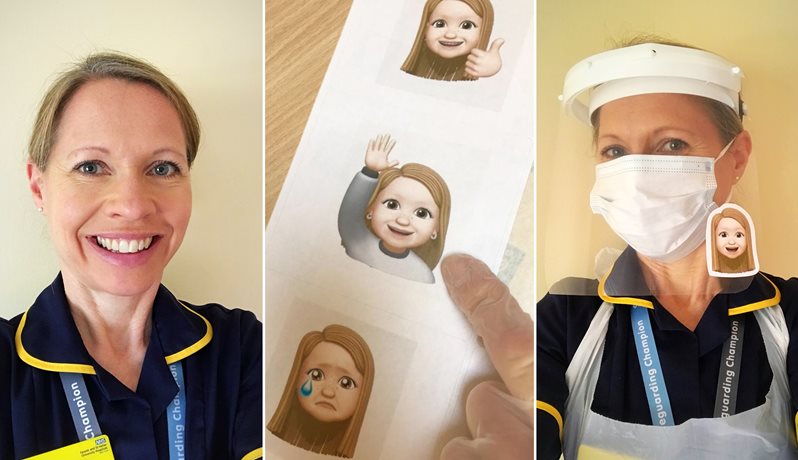A series of stickers has been developed to help staff wearing personal protective equipment (PPE) to communicate with children while wearing masks and visors.
Professor Dame Lesley Fallowfield and colleagues at Sussex Health Outcomes Research & Education in Cancer (SHORE-C), Brighton and Sussex Medical School, developed the stickers in response to a request from Prof Dame Fallowfield’s daughter, Carrie Reeve, who is a Community Children’s Nurse Specialist in Surrey.
Carrie looks after seriously ill and chronically sick children, and was worried that not only might her face mask and visor frighten some of the children but that they could not see her usual smiley or empathic face when they felt sad.

Professor Dame Fallowfield and the SHORE-C team have vast experience in developing, running and evaluating educational programmes for healthcare professionals to help them communicate sad and difficult things with patients.
Professor Dame Fallowfield said: “Research shows that it isn’t just the words one uses that matters – facial expressions and non-verbal communication are really important and can be very difficult to achieve when wearing PPE.” The SHORE-C team created a series of ‘memojis’ which Carrie can stick to her mask or visor as a communication aid.
Carrie said: “It is so difficult to express the essential non-verbal communication to patients and families while wearing PPE, and verbal communication has its difficulties too. The initial greeting when wearing PPE can be scary for both parents and children, so to then perform a painful procedure or one that requires trust can be very challenging.”
Thanks to the memoji stickers, Carrie is now able to ask her paediatric patients which sticker they would like her to use on her mask or visor, and is also able to use the stickers to identify how patients are feeling prior to and after a procedure, or initiate conversation about emotional wellbeing, enabling her to signpost parents to websites and agencies that can provide further support.
“Creative thinking is part of the skill of a paediatric nurse but it is at these times that we need to think out of our usual tool box,” Carrie added.
Lesley and Carrie hope that the use of stickers might also be utilised by other teams and departments across a range of healthcare specialties, including paediatrics, learning disabilities, dementia care and other degenerative conditions.
Carrie is a Childhood and catch up Vaccination Nurse for Tattenham Health Centre (Surrey Downs CCG) one day per week and is a Community Children's Nurse Specialist for Epsom and St. Helier NHS Trust.